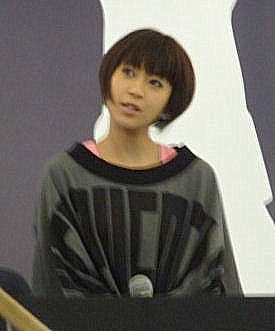Yuki Kuramochi, known professionally as Yuki, is a Japanese musician and singer-songwriter. She is best known as the lead vocalist for Judy and Mary. She founded Judy and Mary in 1991 and became a solo artist in 2002. She has also been a member of the bands NiNa and Mean Machine.

Japanese singer Ayumi Hamasaki has released eighteen studio albums, five compilation albums, twenty-six remix albums, four live albums and numerous singles and promotional singles. She debuted in 1995 under Nippon Columbia with the stage name Ayumi, releasing an extended play Nothing from Nothing, which was a collaboration with Dohzi-T and DJ Bass. Three years later, Hamasaki debuted again as a singer under Avex Trax with the single "Poker Face" (1998). Her first album A Song for ×× (1999) debuted at number one on Oricon's albums chart, and sold over 1.4 million copies.

The discography of Japanese-American R&B and pop singer Hikaru Utada consists of eleven studio albums, three compilation albums, eleven video albums and numerous singles and promotional singles. Utada began as a musician in the early 1990s as a member of U3, a family unit made up of her, her mother Junko Utada, also known as 1970s enka singer Keiko Fuji, and her father, musical producer Teruzane Utada. U3 released their debut album Star in 1993, with the hope to debut in America. In 1996, the group was rebranded as Cubic U, an R&B project focusing on Hikaru Utada, resulting in the English language album Precious in 1998 with record label Toshiba EMI.

The discography of Japanese pop and electronic dance group Perfume consists of seven studio albums, three compilation albums, twenty-eight singles and six video albums. Forming in 2001, the group debuted as local Hiroshima idols, releasing two singles through the independent Momiji Label. In 2003, the members moved to Tokyo to further their career as idols. Signing with independent label Bee-Hive Records, the group met electronic producer Yasutaka Nakata of the band Capsule, who began to produce their music from 2003 onward.

Miho Fukuhara is a Japanese pop singer who made an independent label debut in 2006, releasing a single titled "The Roots" and mini-album titled Step Out. In early 2008, she made her major-label debut under Sony Music Entertainment Japan. Her single, "Change", was the number ninety-two song on the Billboard Japan Hot 100 Singles year-end charts for 2008. With her single, "Let It Out", she had her first major anime tie-in with Fullmetal Alchemist: Brotherhood.
The discography of Japanese contemporary R&B singer and Thelma Aoyama consists of seven studio albums, six compilation albums, one extended play, one remix album, one cover album, two video albums and numerous solo and collaboration singles. Aoyama debuted as a musician in 2007 under Universal Music Japan, and became famous through her collaboration song with rapper SoulJa, "Koko ni Iru yo". Aoyama's version "Soba ni Iru ne" became one of the most successful songs of all time in Japan, certified for three million ringtone downloads and three million downloads by the RIAJ.

"if" is a song by Japanese singer-songwriter Kana Nishino, released on August 4, 2010 by SME Records as her 11th single.

The discography of Japanese musician Kaela Kimura consists of eleven studio albums, two compilation albums, one cover album, three extended plays, twenty-eight singles and five video albums. She debuted as a musician in 2004 under the label Columbia Music Entertainment, releasing ten albums with the company. In 2013, Kimura released Rock, an album of English language covers under her private label Ela Music. In 2014, Kimura released "Ole! Oh!", her first single under Victor Entertainment.

The discography of Japanese recording artist and actor Masaharu Fukuyama consists of ten studio albums, four compilation albums, three remix albums, twenty video albums, and numerous physical and promotional singles. Fukuyama debuted through BMG Japan by releasing the single "Tsuioku no Ame no Naka" (1990) and the album Dengon. The works failed to chart, however, in 1992 the single "Good Night", aided by the popularity it gained through use in the drama Ai wa Dō da, charted on the Oricon Singles Chart, peaking at number nine. In 1993, his album Calling became his first number one album on the Oricon Albums Chart; it has sold over 850,000 copies in Japan and has been certified two-times platinum by the Recording Industry Association of Japan (RIAJ).

"Hotaru/Shōnen" is the twenty-sixth single by Japanese artist Masaharu Fukuyama. It was released on 11 August 2010.
The discography of the Japanese rock band Radwimps consists of thirteen studio albums, ten video albums, and 32 singles. Radwimps debuted as a musical act in 2003 through independent label Newtraxx, releasing the albums Radwimps (2003) and Radwimps 2: Hatten Tojō (2005). After being signed to major label Toshiba EMI, the band released their album Radwimps 3: Mujintō ni Motte Ikiwasureta Ichimai to increasing commercial success.
The discography of Japanese musical act Superfly consists of seven studio albums, four compilation albums, three extended plays, five video albums and thirty-four singles. Superfly began as a duo in 2003 by vocalist Shiho Ochi and guitarist Koichi Tabo; signing with Warner Music Japan in 2007. Tabo left the band in 2007 just before the release of their single "I Spy I Spy", finding it difficult to work as both the act's songwriter and guitarist. However, Tabo remained attached to Superfly, composing and producing songs for the unit until Superfly's single "Ai o Karada ni Fukikonde" (2014) and Superfly's fifth studio album White (2015), where Ochi collaborated with a range of songwriters instead.
The discography of Japanese musical act Rip Slyme consists of ten studio albums, four compilation albums, two extended plays, one live album, eight video albums and thirty-three singles. Rip Slyme debuted as an independent act on File Records in 1995, releasing material with them until their major label debut under Warner Music Japan in 2000. The band's second album under Warner, Tokyo Classic (2002) was a commercial success, selling over 1,000,000 copies.

The discography of Japanese model-singer Kyary Pamyu Pamyu consists of five studio albums, one extended play, ten singles and six video albums. Kyary Pamyu Pamyu debuted in 2011 under Warner Music Japan sublabel Unborde, as a musician produced by Yasutaka Nakata of the electronic duo Capsule. Kyary Pamyu Pamyu's albums have been released globally, with her seeing international success in Belgium, South Korea and Taiwan.
The discography of Japanese pop singer Kana Nishino consists of seven studio albums, six compilation albums, thirty-four singles and ten video albums. Nishino debuted in 2008 under Sony Music Japan, and gained national recognition with the singles "Tōkutemo" and "Kimi ni Aitaku Naru Kara" (2009). Nishino has released some of the most digitally successful songs in Japan: "Motto..." (2009), "Dear..." (2009), "Best Friend" (2010), "Aitakute Aitakute" (2010), "If" (2010) and "Kimi tte" (2010), all of which were certified million by the RIAJ.
The discography of Japanese pop and jazz vocalist Juju consists of six studio albums, four tribute albums, two extended plays, two live albums, five video albums and numerous singles. Juju debuted as a singer in 2001, collaborating with artists such as DJ Masterkey, Spontania and worked on the soundtrack for the film Kyōki no Sakura.

The discography of Japanese-American musician Beni consists of eight studio albums, two compilation albums, six live albums and three cover albums and twenty-six singles. Beni debuted in 2003 as a member of the Pony Canyon idol group Bishōjo Club 21 under the name Beni Arashiro, and in 2004 made her solo debut with Avex Trax.
The discography of Japanese pop group AAA includes eleven studio albums, six extended plays, seven compilation albums, eight live albums, one cover album, three remix albums, and 52 singles. All of the group's releases have been with Avex Trax, a subsidiary of Avex Group.
The discography of Japanese singer-songwriter Kazumasa Oda consists of ten studio albums, four compilation albums, two cover albums, three video albums, and thirty solo singles. Oda began his career as a performer of the folk-rock band Off Course. He began releasing solo material in 1985. His 1991 single "Oh! Yeah!" / "Love Story wa Totsuzen ni" topped the Oricon Singles Chart and was certified two-times million by the Recording Industry Association of Japan (RIAJ). When his 2016 compilation album Ano Hi Ano Toki topped the Oricon Albums Chart, Oda became the oldest artist in the country to achieve the accomplishment.

The discography of Japanese musician Miwa consists of six studio albums, one compilation album, seven video albums and twenty-five singles. After releasing two independent singles, Miwa debuted through major label Sony Music Entertainment Japan with the single "Don't Cry Anymore" (2010), a song used as the theme song of the drama Nakanai to Kimeta Hi. The song was commercially successful, and was eventually certified Platinum by the Recording Industry Association of Japan. This song, along with her third single "Change", used as a theme song for the anime Bleach, led her debut album Guitarissimo (2011) to debut at number one on Oricon's album charts.











